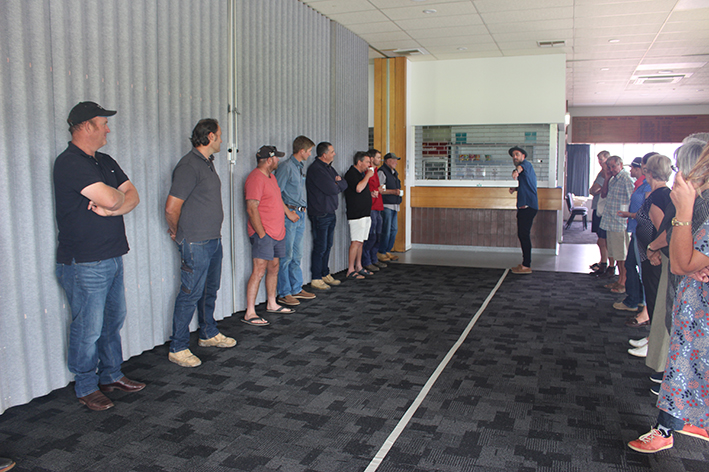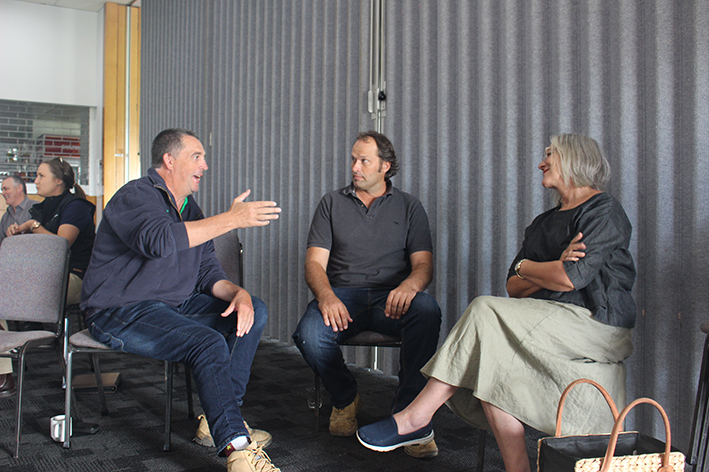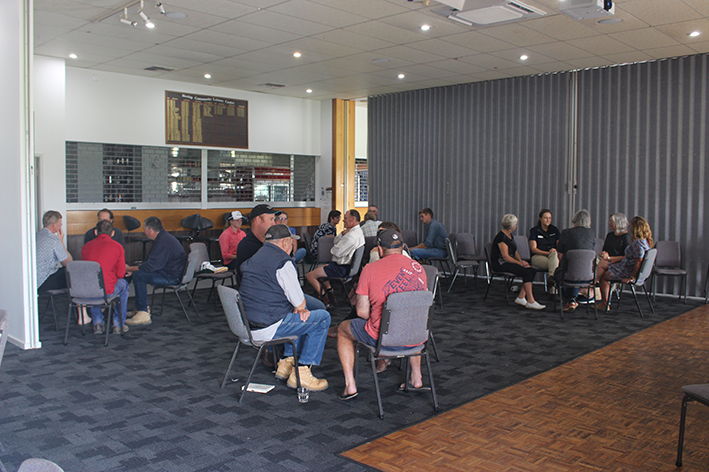Foundation for Rural & Regional Renewal (FRRR)
Farm businesses are inherently stressful workplaces. Managing the vagaries of climate change, working with family members, and doing so in an isolated farm environment, can be hard.
Often in farming, family and business are intertwined. The Birchip Cropping Group (BCG) was hearing from local farmers about the consequences poor communication can have on the farm business, the bottom line, safety and mental health.
Feedback from young farmers had identified poor communication as a key source of stress, anxiety and isolation, which subsequently has negative effects on their mental health.
BCG secured an In a Good Place grant to hold a one-day Tomorrow Farmer event, to discuss the skills that all members of the farming operation require to have the crucial conversations about farm business prosperity, without compromising the social fabric of a family. The event focussed on how to manage and maintain positive mental health during these conversations. Improving their ability to communicate and have the ‘difficult conversations’, often across generations, was the aim of this project.
After rescheduling three times due to lock downs, the training, which was led by Tom Bell from Tomorrow Man, was held on 16 March 2022. And it wasn’t just for men – it was open to everyone interested and there was a broad cross-section of ages that attended.
Approximately 40 farmers, advisers and industry representatives attended the event with a further 20 people registered but unable to attend due to needing to isolate as per COVID guidelines.
While the numbers were less than anticipated, this allowed the group to participate in interactive sessions without the need for a panel session. Tom created a safe and intimate environment for people to feel comfortable asking questions and sharing experiences throughout the sessions.
The sessions covered active listening, asking the right questions, storytelling for connection, being authentic, and knowing when to call in extra support to make important decisions.
The engaging and participatory event provided a framework for ongoing, open and honest communication – a tool as useful as any other in a farmer’s toolbox.
When surveyed about the benefits gained from the event and what tools they planned to implement as a result of attending, the resounding answer was to ‘listen more!’.
“It was one of the best events to meet people in the BCG in my experience and I found it to be a very energising day. Thank you!”
New partners join FRRR’s In a Good Place program
More funding is now on offer to support mental health projects in remote, rural and regional communities, thanks to new supporters of FRRR’s In a Good Place grants program, with grants of up to $20,000 are now available.
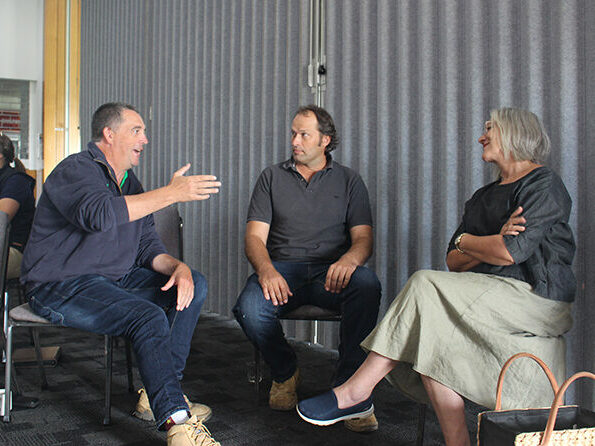
First established in 2018 with the support of CCI Giving, the program’s focus has been on supporting community-driven initiatives that reduce social isolation, increase social participation and connectedness, and increase help-seeking for people within rural, regional and remote communities who are at risk of, or are experiencing, mental health issues.
Now the IAGP program is expanding, adding a stream focussed on farmers and farming communities, following the recent National Farmer Wellbeing Report, which was presented at a recent mental health and wellbeing forum, hosted by National Farmers Federation (NFF).
The Report revealed that in recent years, 45% of Australian farmers have felt depressed, with 64% experiencing anxiety. The causes of this are many-fold, but top among them were weather or natural disasters (47%), financial stress (36%) and inflation and cost pressures (35%). Add to this that 76% of Australian farmers believe that the role they play is undervalued by the Australian public and it’s not hard to understand why farmers and farming communities are experiencing declining mental health.
The Report called for additional funding and support, which prompted six new partners to join FRRR’s IAGP program, alongside CCI Giving – Macdoch Foundation, Jibb Foundation, Morris Family Foundation, Norman Family Foundation and Rebecca Gorman & John Sevior.
These funders have committed to the program for three years, ensuring dedicated funding for farmers and farming communities from 2024-2026. In total, $1,063,000 has been committed over the next three years.
FRRR’s CEO, Natalie Egleton, said that the insights shared by farmers and farmer advocates, reaffirm the relevance of the In a Good Place program, and the role it can play in supporting the wellbeing of farming communities.
“These firsthand experiences and insights, highlight the need for investment in projects that promote preventative and responsive mental health approaches in farming and agriculture-dependent communities.
“Critically, the additional funding will help to address gaps in services by upskilling people locally and bringing in experts, so that locals in farming communities can better support one another.
“Thanks to the generous support of our new partners and CCI Giving, we can build on from the valuable impact that the IAGP program has had on rural Australia over the last six years, by ensuring farming communities can access more funding to develop the community-led, place-based solutions that make sense, locally,” Ms Egleton said.
Jeremy Yipp, Chair of CCI Giving, is also pleased to see the expansion of the program.
“The events of recent years have added complexity to the challenges that remote, rural and regional communities face. But we’ve seen first-hand that by supporting projects that remove barriers to people getting appropriate support, we can make a lasting difference. So it’s wonderful to have more organisations coming on board, enabling FRRR to support even more non-clinical approaches that are community-based and accessible at a grassroots level. It will mean that even more communities can access support,” Mr Yipp said.
Michelle Gortan, CEO of Macdoch Foundation, one of the new partners, said that due to increasingly variable weather conditions, financial and market pressures, and the need to navigate industry and land use transitions, there is a need to ensure farming communities are feeling well-supported.
“Maintaining good mental health and community wellbeing is multi-faceted and a lifelong process that requires a range of different approaches. We recognise that local communities know what will work in their particular context, and as a collective of funders, we are delighted to be partnering with FRRR so that that agricultural communities can design and implement community-led solutions that are fit for purpose.
“FRRR’s special tax status means that as partners, we can respond practically to the issues raised in the National Farmer Wellbeing Report and ensure funding reaches grassroots communities to support improved community wellbeing and mental health, which ultimately helps to create a stronger Australia,” Ms Gortan said.
The expanded program supports a range of approaches that are preventative or responsive in nature, reduce social isolation by increasing social participation and connectedness, and reduce stigma surrounding mental health by encouraging open discussion and supporting self-help-seeking. Communities of less 10,000 will receive priority.
Grants of up to $20,000 are available from a funding pool of at least $290,000. Grants are available via two streams:
- Community wellbeing – focussing on mental health and wellbeing within remote, rural and regional communities;
- Farmers and farming communities – supporting mental health and wellbeing of farmers and the communities they live in.
Applications are via an expression of interest process, with EOIs due 30 April, with final applications for those shortlisted due 15 May. Learn more at: https://frrr.org.au/funding/place/in-a-good-place/.
FRRR would also welcome more partners for this program. Potential supporters should contact partnerships@frrr.org.au or call 03 5430 2399.
Karridale, in the Blackwood region of southwest Western Australia, is home to a rich agricultural community. Established in 1991, the Lower Blackwood Land Conservation District Committee (LBLCDC) draws its membership from local landholders who have an interest in sustainable agricultural and land management practices that will protect and conserve their special environment.
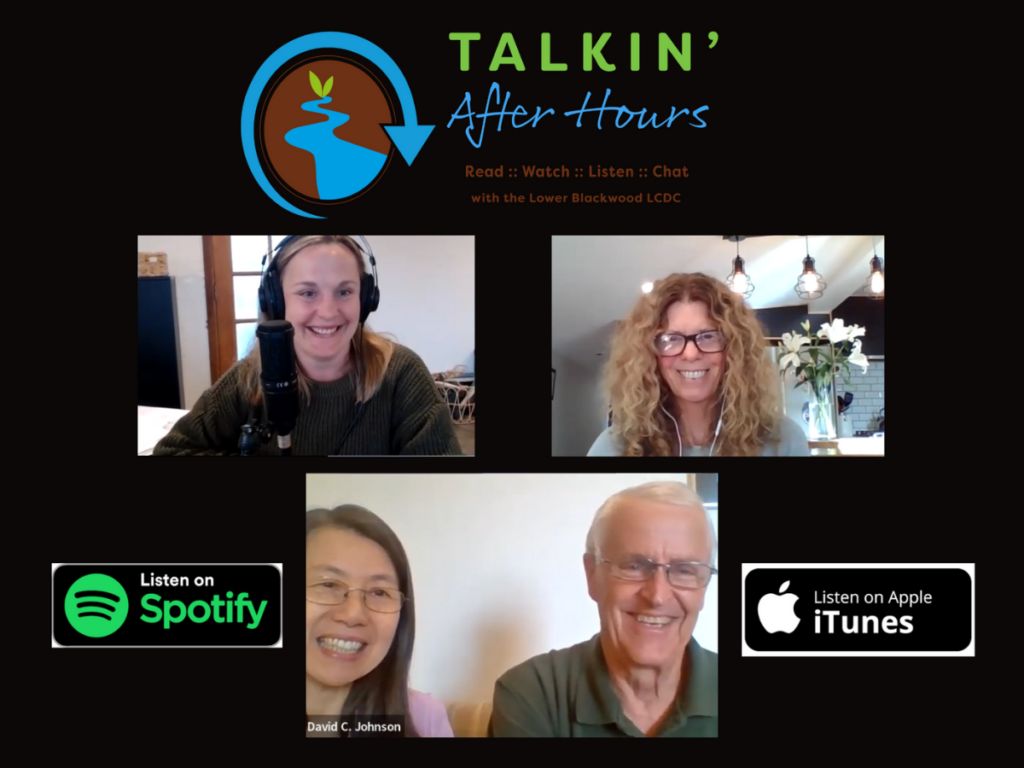
There is growing interest and awareness among local farmers of regenerative agriculture principles as a way to sustainably manage their land and productivity and strengthen their drought resilience. However, the LBLCDC identified a need for greater understanding of these principles, as well as how to implement them.
They noted a lack of access to resources and expertise to support farmers in creating resilient and responsive landscapes. They also saw the need for more peer-to-peer support and believed that conversations could combat isolation and foster a sense of community among local farmers.
In 2022, the LBLCDC decided to develop an online community forum and information hub that could bring the community together to connect and learn. Supported by the Australian Government’s Future Drought Fund, FRRR provided $49,850 through the Networks to Build Drought Resilience program to assist the LBLCDC with the design and delivery of their digital platform.
Driven by a content manager, the establishment of their online community (known as Talkin’ After Hours) allowed for the development of significant new drought resilience content. Although hampered by short timelines, the platform produced and delivered six webinars and five podcasts, with a further podcast, six written pieces and six short videos also developed and ready for release over the coming months. Each piece of content focused on one farm landscape management component that assists land managers to prepare for drought.
Feedback from platform users has been incredibly positive, with one user noting that they got more useful information from one 90-minute Talkin’ After Hours webinar “than in a whole year’s worth of ag school”.
“The easy access and on-demand format of the content allows landholders to access learning opportunities and information at a time and place that is convenient for them. It also offers the ability to share ideas, discuss and compare notes on issues, actions and solutions with other community members in a safe and convenient space, and promotes a more adaptable and resourceful community.”
The LBLCDC has been excited by the level of engagement with the platform, based on webinar registrations and content download figures. Across the six webinars delivered, there were 525 registrations and 11,175 YouTube views. In addition to this, there were 1,482 downloads of the podcasts. There was an even split of male and female participants involved, with a broad range of community members engaging with the project. While 70% of participants were between 45-64 years of age, it’s anticipated that given the online delivery format of the project, engagement will continue to grow, particularly with younger community members as they access podcasts and webinars recordings.
This new network is expected to expand as new community members become aware of the project. Going forward, they intend to continue expanding the platform to reach more community members as they release their developed content, and also intend to engage with their local Indigenous group, the Undalup Association Inc, for their input and ideas on content.
Talkin’ After Hours has increased the social connection of Lower Blackwood farmers and landholders. The interactive and engaging platform has helped build their resilience to future drought and fostered community and connection by developing a cohesive, relevant and applicable resource base for individual and community learning.
“The ability to be able to share ideas, discuss and compare notes on issues, actions and solutions with other community members in a safe and convenient space has and will promote a more adaptable and resourceful community.”
Upper North Farming Systems’ (UNSF’s) mission is to facilitate capacity building and empowerment of the agricultural community across the upper north region of South Australia. The group focuses on adapting and connecting farmers so they can learn from each other and from their shared experiences, and not farm in isolation. They do this by bringing farmers together in what they call Hubs. It’s a large and diverse geographical area, encompassing Booleroo Centre, Crystal Brook, Hallet, Jamestown, Laura, Peterborough, Nelshaby, Orroroo, Quorn and Wilmington. It’s a harsh climate, and when times are tough, they are very tough. The region has experienced significant declines in population and services over the past 30 years and the social fabric of communities in many areas has become frayed.
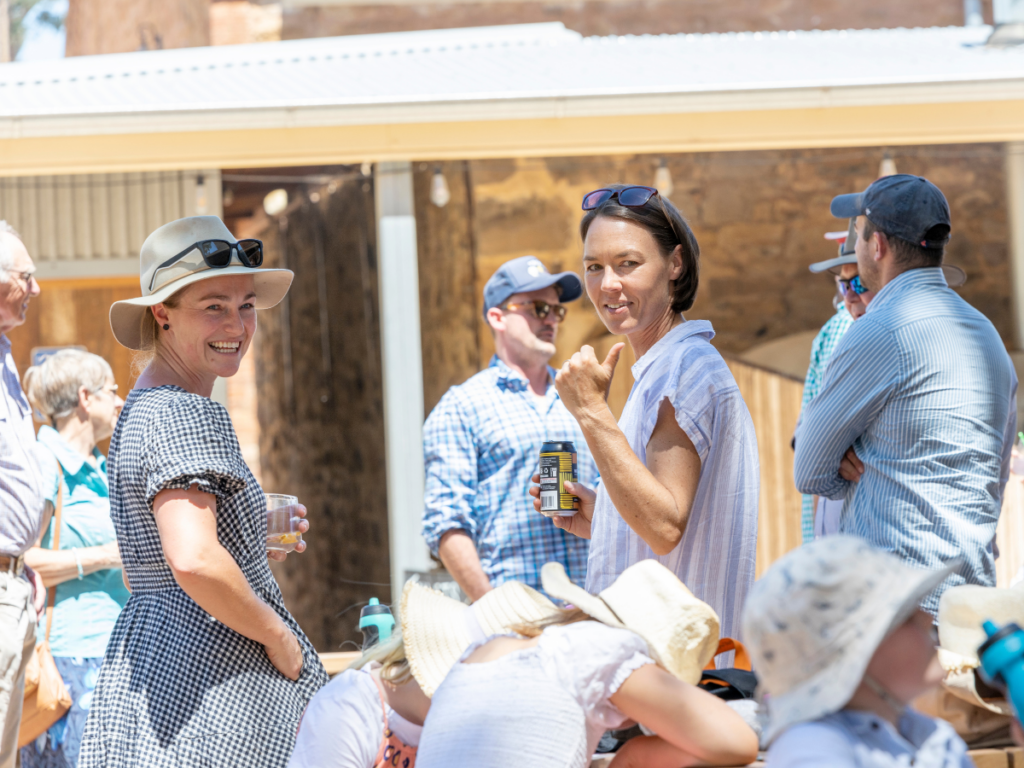
With the majority of communities in the region still reliant on agriculture, the social toll of the latest drought – the longest dry on record in 2020/21 – was evident, with symptoms of volunteer burn-out, self-isolation and mental health related issues.
Farmers know technology is essential, and farming systems have evolved significantly since the previous major drought, with stubble retention, improved efficiency of water use and a better understanding of livestock nutrition.
These communities are adaptable, open to innovation and aided through programs that promote not only professional connection, but also social and community connections, especially as these areas are typically not well-serviced by government research bodies and private consultants.
There are currently 11 Hubs under UNFS – eight geographical Hubs: Booleroo / Appila, Morchard / Orroroo / Pekina / Black Rock, Melrose, Gladstone / Laura, Jamestown, Nelshaby, Quorn and Wilmington and three non-geographic Hubs: Ladies on the Land, New Farmers and the Ag Tech Hub. The establishment of the Hubs in 2019 recognised the need to retain networks within the group and foster the tackling of issues on a smaller scale, as well as the importance of coming together on a social level.
A $20,000 Networks to Build Drought Resilience grant enabled UNFS to deliver the ‘Tools, Tech and Transformation’ workshop for farmers and agribusinesses. The key event was followed by a series of nine Hub events to provide the opportunity for networking, info-sharing, and learning about new farming systems and techniques to improve drought resilience. A ‘farmer-to-farmer’ learning model was recognised as a valuable and efficient mechanism to improve the productivity, profitability and sustainability of the agricultural industry in low rainfall zones.
“Through the Tools, Technology and Transformation event series, farmers and landholders have been provided with an abundance of information that can be adapted and changed on farm. Therefore, these tools that have been taken from the events can help farmers change their way of thinking and help their preparedness for drought or any other climate challenges they may face.”
The project reached 205 participants across 10 events that spanned six sector networks (Farm Business, Research Institute, NFP’s / Community Organisations, Consultants, Off Farm Business, Government Agency). Targeting farmers and agri-business directly, attendees learnt about tools aimed at improving efficiencies, sustainability and outcomes of operations like automatic feeding, as well as technology evolutions and business systems like satellite imagery on the farm scale, and succession and transition planning. Importantly, the solutions offered were all commercially available to be adopted on-farm, and farmers were able to speak directly with professionals in the fields, with discussions encouraged. They left with up-to-date knowledge to help them build more resilient farming systems.
The Hub events ensured accessibility for farmers who couldn’t afford too much time away from their land. They were able to talk with neighbours and researchers about the outcomes of the 2021 season and what they might be able to do better next time. Questions like when and how to de-stock, how to ensure you’re looking after genetics and bloodlines, and considerations around agisting, planting times, and upgrading tech vs repairing machinery were raised. Each Hub session included a training session in a tool, tech or system (identified from the key event by their elected Hub Representative), as well as a planning session identifying how to implement the new skills and knowledge on-farm, and where they require additional support.
Through the project, participants built knowledge and understanding of the risks posed by drought and climate change and learnt new concepts on a range of topics that can be adapted for drought and climate preparedness.
Communities had the opportunity to connect, train, converse (something many would not normally do in their usual day-to-day business) and lean on systems and each other so they are more prepared for future challenges.
For many remote, rural and regional communities, drought has been impacting families and businesses for years. Even though it is not always covered in mainstream news, those living in certain parts of Australia know all too well what lasting effects drought can have. For many working in the agriculture industry, the thought of current and future drought can be a stressful and frightening prospect with crops and livestock often hit the hardest. However, in each of these communities there is a fighting spirit, often driven by community-led groups and not-for-profits (NFPs) that work hard to support the wider community.
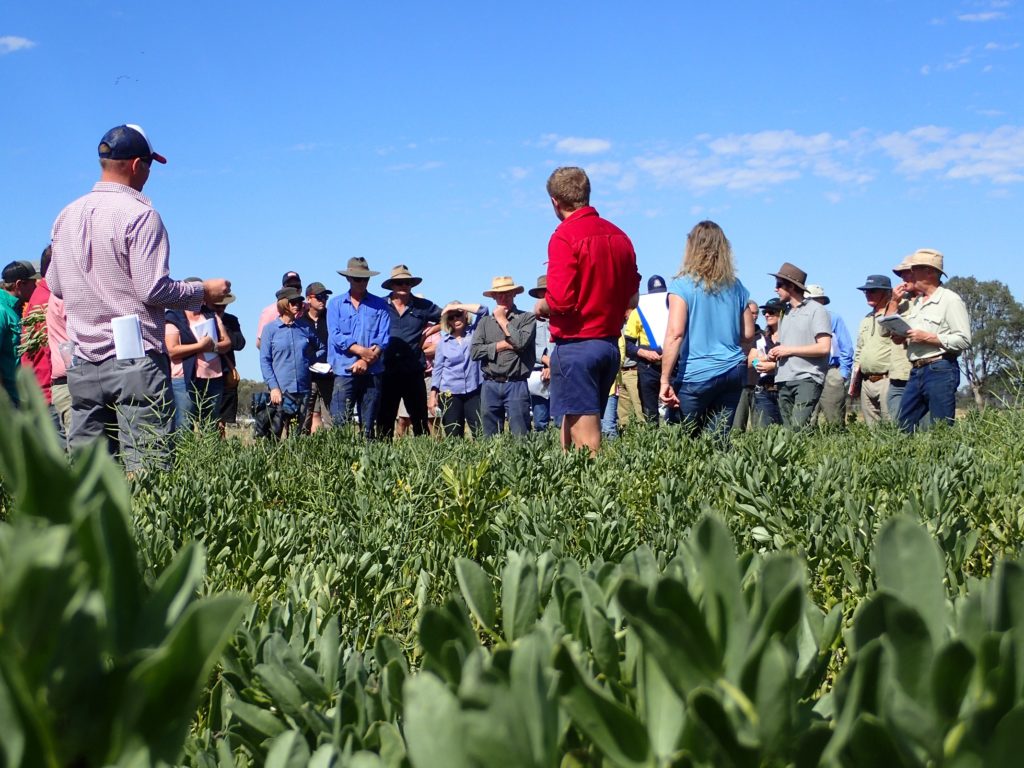
One of these groups is the Gippsland Agricultural Group who are driven by achieving results for farmers in the south east region of Gippsland in Victoria. The organisation is made up of Central and East Gippsland farmers and service providers that have joined forces as people with the shared desire to improve productivity, profitability and sustainability using research, collaboration, product trails and demonstrations to communities in the area.
One example of how Gippsland Agricultural Group planned to achieve this was by holding multiple field days. The Gippsland ‘Connect and Prepare’ field days were designed to build a sense of place and connection for farmers. Research conducted shows that farmers are most comfortable learning from other farmers in informal settings such walking around a paddock talking or learning while doing. For Gippsland Agricultural Group, providing resources like easy access to agricultural service providers, mental health and financial support, as well as strategies and tactics and practical learning, are all key to strengthening preparedness and resilience to future drought events.
Using a $42,920 grant through the Australian Government’s Future Drought Fund Networks to Build Drought Resilience program, Gippsland Agricultural Group held two farmer field days. Both days focused on farmer mental health and wellbeing by bringing health service providers to an environment where farmers are comfortable and feel they will be more likely to engage with services. Each day also featured key staff from other agricultural networks to encourage relationship development, project collaboration and sharing of ideas and resources. The first field day targeted producers, with a focus on networking and connecting with one another and relevant agriculture service providers.
While the field days are a great way to network and increase social interaction, the key purpose of the events is to build knowledge and skills with the estimated 200 producers, 15 agricultural agencies and service providers, and eight agricultural produce-led focus groups.
These events increased participant knowledge and understanding of the risks posed by drought by offering a program that shared information on climate variability. The events carried positive messaging about the resilience of regional producers focusing on practical, implementable drought preparedness solutions for everyday mum and dad farms.
In addition to funding the field days, the grant also enabled the installation of basic toilet facilities at a site frequently used for social and professional networking events. The community now has access to a space that supports educational, social and networking activities in a safe and hygienic space.

